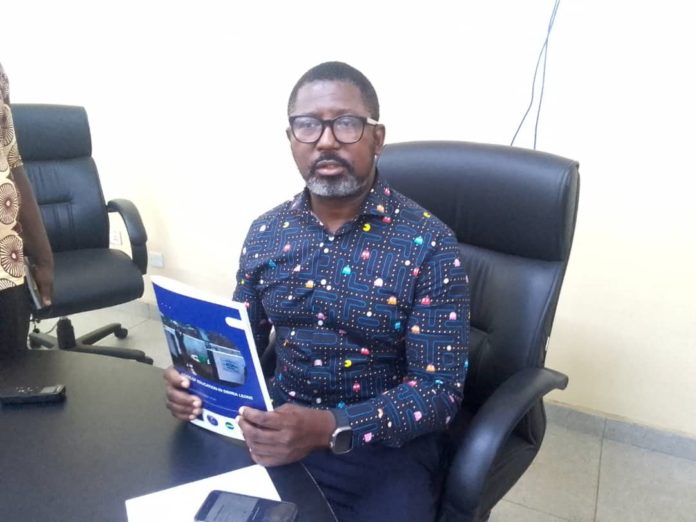By Yusufu S. Bangura
The Executive Director, Institute for Governance Refund (IGR), Andrew Lavalie, has on Friday 1st March during the launching of the State of Education Report 2023 at the Ministry of Basic and Senior Secondary Education (MBSSE) conference room, stated that access to water sources in schools stands at 57%, emphasizing the urgent need for investment.
The engagement was witnessed by members of NPSA, a consortium of CSOs, led by the Institute for Governance Reform, EU delegation and stakeholders from MBSSE, among other attendees.
In his presentation, Lavalie said the 2023 State of Education Report was jointly produced by the National Partnership for Social Accountability, a network of 45 local civil society organisations with funding from European Union, as an embodiment of citizens’ feedback on the investments the government, households, and development partners are making to improve basic and senior secondary school education in Sierra Leone.
He stated that the survey was done in five selected districts, Falaba, Karene, Kono, Tonkolili, Western Rural and Moyamba because those communities for the past three to four years, have not been performing in terms of learning outcomes.
A mixed-methods approach was employed by the NPSA, combining quantitative and qualitative research methods, he said. The research included document reviews, in-depth interviews with key stakeholders, and surveys conducted among households and school staff. Random sampling identified 2,400 households and 400 schools across the country, providing robust data.
Lavalie said in the last five years, government and partners embarked on a transformative journey to enhance education quality and accessibility through the Free Quality School Education (FQSE) initiative.
To implement the FQSE, government allocated (starting Financial Year, 2020) an unprecedented 22% national budget to education and introduced a Radical Inclusion Policy to accelerate the reach of education to excluded groups and communities.
Lavalie said the first page of the report which was signed by the Minister of MBSSE shows stronger commitment of the ministry to actually take onboard and act on the feedback of parents and users of education services, which is incredible for them to providing direct feedbacks to the ministry from the field.
He said textbook availability varies significantly by district. Currently, Western Urban district has the highest availability at 79%, while Karene and Falaba districts have the lowest availability with only 55%. On a national average, the availability of textbooks stands at 67%.
Nationally, 99% of schools reported receiving routine monitoring visits from the District Education Office (DEO) supervisor’s inspectors and Local Council (LC) representatives, demonstrating a strong commitment to maintaining educational standards and compliance with policies.
He said in the area of teachers’ attendance in school, 20% of parents said that they sometimes did not see teachers arriving on time, therefore by the signature of the ministry it is a way of telling teachers that parents are watching them and next year they wish to see greater improvement in the next state of education 2024.
Among the key recommendations of the report are to harmonize the approaches related to teacher conduct, the TSC should develop and enforce a ‘compliance adherence system’ informed by the teacher code of ethics, which should be signed by all recruited teachers in government–assisted schools.
Establishing and enhancing Water, Sanitation, and Hygiene (WASH) infrastructure in schools is crucial to addressing significant needs in basic facilities like toilets and water sources.
Another strong recommendation is to speak to the ministry to strongly coordinate the investment made by NGOs especially in remote communities where education can be weak.
On his own part, the European Union Ambassador to Sierra Leone, Manuel Muller said “We feel that the implication of the civil society in the definition and follow up of the implementation of the sector policies is an important factor to ensure proper public service delivery. Therefore, I will like to congratulate the National Partnership for Social Accountability Network for their contributions to this report.”
The Chief Education Officer MBSSE, Professor Yatta Kanu underscored that there was no discrepancy in of the report in relation to their areas of interest, describing it as well concrete study.
While launching the report, Minister of MBSSE, Conrad Sacky said they saw the report as a reflection of the work they were doing and that they took it very seriously because it provides them an opportunity to engage with those who are the beneficiaries of their services, the opportunity to become co-producers of those very services and therefore what they say should be used to inform and improve the services that they offer.
“Through the government Free Quality School Education Program (FQSEP), we have seen significant gains as we now have one million pupils enrolment in schools. We have also seen successes in learning outcome in all public examines. Our pupils and the community they comes from now have access to free tuition, examines, teaching and learning materials, new classroom blocks and through EU funding, we now have science equipment in our labs,” he praised.





